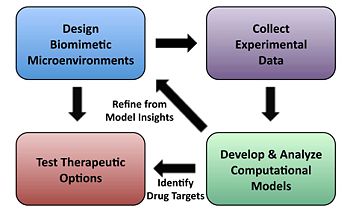Kreeger: Difference between revisions
From OpenWetWare
Jump to navigationJump to search
No edit summary |
No edit summary |
||
| Line 14: | Line 14: | ||
<font size="2.5"> | <font size="2.5"> | ||
The Kreeger lab utilizes systems biology and tissue engineering to analyze this question in the context of women’s health. We utilize an iterative approach, where we develop model culture systems that allow us to study these diseases in a controlled environment. We then use a variety of high-throughput experimental methods to gather information about the cellular signaling network and employ computational models to interpret the data. Ultimately, we believe our models will be utilized to identify new drug targets and match patients to the most effective drugs for their individual disease characteristics. Women’s health has historically been under-explored; thus, our research program offers a unique combination of innovative inter-disciplinary approaches in an urgent application area. | |||
<br> | <br> | ||
Revision as of 14:54, 14 December 2010


